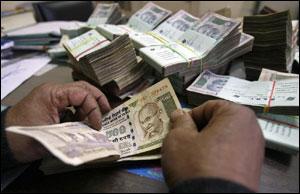Medium- and long-term debt funds are likely to perform better with each rate cut; returns from FDs will improve but may remain negative, writes Devangshu Datta.
The high inflation of the past three years, coupled with policy actions by the Reserve Bank of India (RBI) and the government’s bloated fiscal deficit, has caused unusual trends in interest rates. There is a disconnect in terms of prevailing rates for different classes of players.
 RBI has, despite its hawkish rhetoric, done quite a lot to stimulate growth. Since June 2012, it has cut the repo rate by 100 basis points (one percentage point) and cut the cash reserve ratio several times as well. However, growth has slowed and inflation as measured by either of wholesale and consumer price indices has not really come down.
RBI has, despite its hawkish rhetoric, done quite a lot to stimulate growth. Since June 2012, it has cut the repo rate by 100 basis points (one percentage point) and cut the cash reserve ratio several times as well. However, growth has slowed and inflation as measured by either of wholesale and consumer price indices has not really come down.
One reason why RBI’s gamble didn’t work could be that banks have kept a large spread in their favour on corporate and retail lending rates, instead of passing on rate cuts. At the same time, the massive stock of non-performing assets has cut bank profits. Non-banking financial companies (NBFCs), which have a higher cost of funds than banks, have also struggled.
From the point of view of the retail investor, returns in terms of real interest rates have been negative. Retail inflation has run high. Fixed deposit, which are preferred retail savings instruments, have consistently offered returns lower than retail inflation. Debt funds have also offered negative returns through much of 2010-12.
From the point of view of the retail borrower, lending rates have been high. There has been no incentive to borrow for either discretionary spending or to finance real estate purchases. From the point of view of the corporate borrower, too, rates have remained crushingly high. There has been no incentive to borrow for expansions because demand has also been low.
Banks and domestic institutions have another investment avenue in terms of the government borrowing programme. This has absorbed huge sums. Domestic institutional investors (DIIs) alone have contributed Rs 5 lakh crore to the bond market in the past year. If we use the Wholesale Price Index (WPI) as the index of institutional inflation, returns from government instruments have been on the positive side in real terms.
A period of real negative rates as experienced by the retail investor should have interesting behavioural consequences. Logically, it should lead investors to pull out of debt and look elsewhere. It doesn’t seem to have had that effect.
Behavioural research across other markets which have suffered prolonged periods of negative real interest rates, suggests retail investors don’t shift away from debt very easily. They actually tend to overload on basic FD debt when interest rates go negative.
This is perhaps because few retail investors bother to look at retail inflation and track the real returns from debt. The nominal rate is often misleading in a period when inflation is high and rates are correcting upwards with a lag. The retail investor sees only the higher nominal rates and forgets to factor in inflation.
The mental block means retail investors lose in several ways. They don’t switch to other instruments when rates are negative in real terms. Nor do they invest more heavily in debt when rates are positive in real terms.
Barring upheavals, RBI will probably continue cutting rates through the next year, albeit by cautious minimal amounts. Banks will pass on those cuts in a skewed fashion, adjusting FD rates downwards to a greater degree than the rates at which they lend.
Retail inflation, where food has a 48 per cent weight, is unlikely to drop a great deal. Returns from FDs will improve in real terms but are likely to remain negative for a while. But debt funds dealing in medium- and long-term portfolios will see capital gains, as their portfolios will appreciate on every rate cut.
It could be a good idea to switch to debt funds from FDs. Debt funds are not “safe” investments, since these experience capital gains and losses. But a long phase of rate cuts is the ideal situation for a debt fund and investors who switch from FD to debt funds over the next quarter could see excellent returns over the next year.











